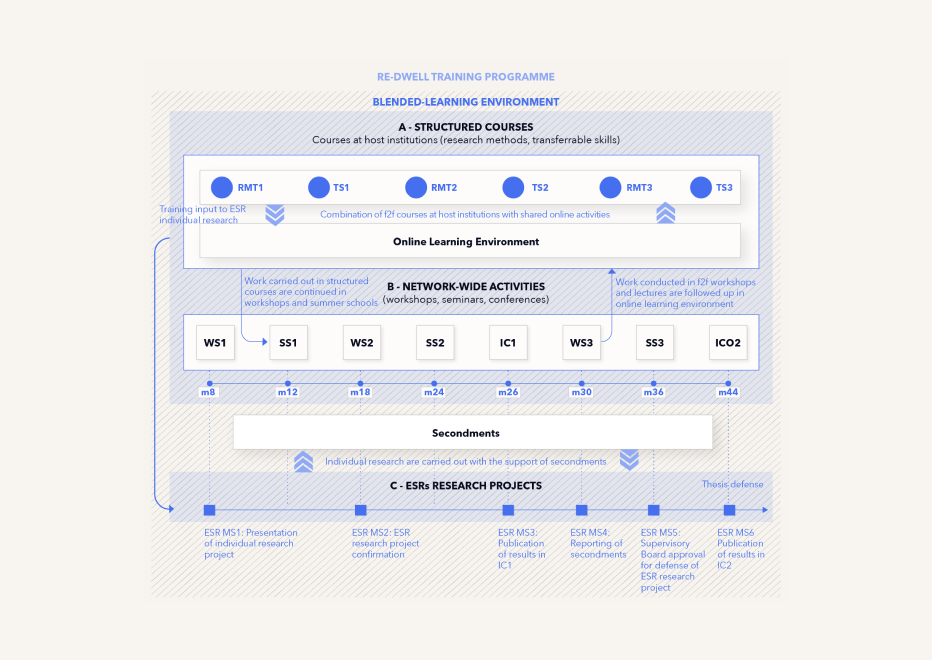Training
RE-DWELL’s innovative research programme and environment will provide a platform for a holistic analysis of affordability and sustainability of housing through a transdisciplinary perspective.

The development of the ESR will follow a structured sequence, with milestones which will be verified along the meetings taking place in the network-wide activities.
Download Training Planning ↴A. Structured training courses
To design and implement the procedures for the effective scientific, administrative, and financial management of the project, while maintaining a fluent and effective communication with the funding programme; to assure the project runs as planned and optimises the use of resources ensuring that the scientific and technical objectives are achieved with a high-quality level; to assure the integration of the various strands of the project into a coherent line of work; and to coordinate and effectively implement the network activities (workshops, summer schools, conferences) in accordance with the work programme.
Training courses are of two types:
Research Methods and Tools.
Courses which will support the creation of transdisciplinary research network across the ESRs research projects, including: transdisciplinary research methods (RMT1), comparative methodologies for qualitative and quantitative analysis (RMT2) and transferring research findings to community (RMT3).
Transferrable Skills.
Courses to foster personal qualities (TS1), entrepreneurship and professional career (TS2) and communication, engagement and impact (TS3).
B. Network-wide training activities
Network-wide activities will enable ESRs and supervisors to meet f2f at least every six months during the recruitment period of 36 months. These activities will be intertwined with the work carried out in the structured courses. Preparatory activities will be jointly carried out in an online learning environment created for this ITN.
Workshops (WS).
Three-day workshops will be carried out in Lisbon (m16), Zagreb (m28) and Budapest (m40). Each workshop will focus on one of the three main research areas, while exploring the connections with the other two. The purpose of the workshops is to follow-up the development of ESR research, to foster the interlinking between the individual research projects, to carry out specific training activities related to on-going structured courses (research methods and tools, transferrable skills), to engage external stakeholders in the ITN actions (non-academic sectors, local administrations, civic organizations, dealing with sustainable and affordable housing).
Summer Schools (SS).
Five-day summer schools will take place in Nicosia (m12), Valencia (m24) and Reading (m36). They will be open to external participants (PhD students, young researchers, academics, professionals and community), following the model successfully implemented in the postgraduate OIKONET workshops in Valencia (2017), Lisbon (2018) and Skopje (2019). They will be a core component of the dissemination programme and help to showcase the ongoing research and to subject this to the criticism of external stakeholders.
International conferences (IC).
Two international conferences in Grenoble (m24) and Barcelona (m44) will bring RE-DWELL research into a scientific context. They will continue the successful “Global Dwelling” series organized within the OIKONET project in Barcelona (2014), Bratislava (2015), Manchester (2016) and Volos (2018).
C. Individual research projects
Fifteen ESR individual research projects will address the problem of A&S housing collaboratively and in a transdisciplinary manner. Each project includes topics that concern various disciplines and sectors.
The supervising team is composed of representatives of the various disciplines and sectors involved. In addition, measures to support the interactions between individual research projects will be adopted throughout the overall training and research programme including periodically exposing research development to other peers, co-authoring papers and articles, and joint exhibitions of research outputs. Besides, there will be tangible outputs highlighting the links between individual research projects: (a) a vocabulary of terms about A&S jointly created by the ESRs; b) a digital library of documented case studies on innovative A&S housing, jointly created by ESRs, and (c) interdisciplinary analysis of the state of affordability and sustainability in housing (policy, design, construction, financing), in reports and publications, jointly authored by ESRs and supervisory board members.
In order to foster the transdisciplinarity of the research, the supervision of each ESR individual research will involve representatives from various disciplines and sectors. To exploit the potential of the whole network, each ESR will have a primary research area and a primary supervisor from the institution where s/he is enrolled, at least one co-supervisor from another academic beneficiary, and an advisor from the partner organisations where secondments are carried out. Members of the supervisory team will share information on the ESR research through standardized annual progress reports and will meet at project events and through teleconference to jointly discuss their progress. The primary supervisor will regularly submit a joint report to the Supervisory Board (SB) which will propose monitoring arrangements, identify training needs, set targets, assess progress and streamline training programmes for all ESR’s individual research projects.
